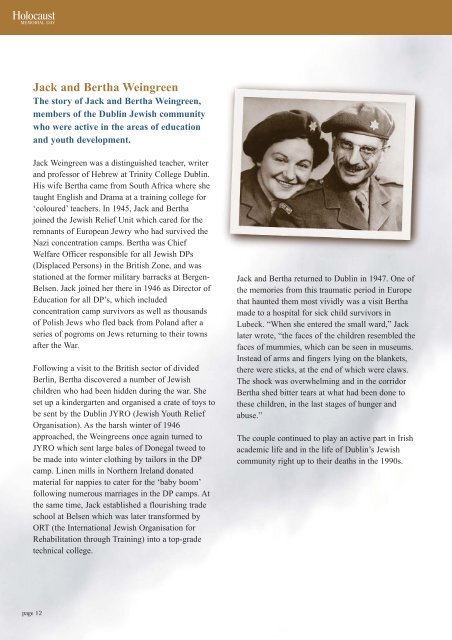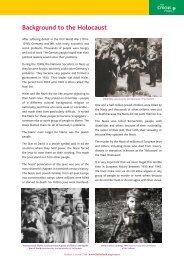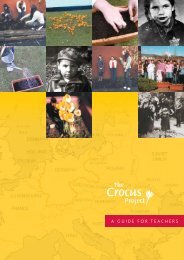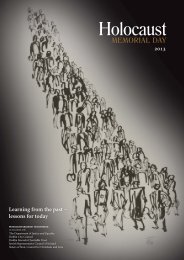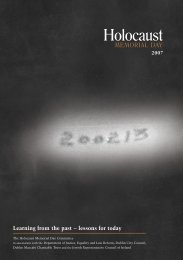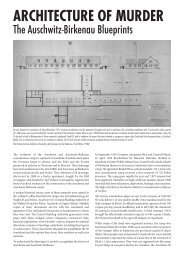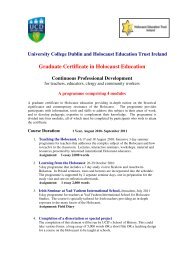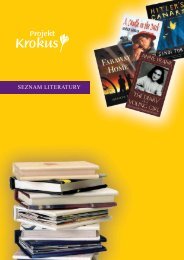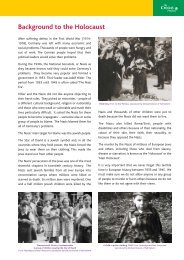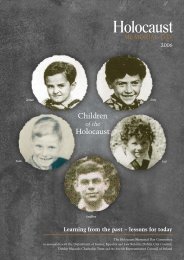Lynn Jackson brochure - Holocaust Education Trust Ireland
Lynn Jackson brochure - Holocaust Education Trust Ireland
Lynn Jackson brochure - Holocaust Education Trust Ireland
You also want an ePaper? Increase the reach of your titles
YUMPU automatically turns print PDFs into web optimized ePapers that Google loves.
<strong>Holocaust</strong><br />
MEMORIAL DAY<br />
Jack and Bertha Weingreen<br />
The story of Jack and Bertha Weingreen,<br />
members of the Dublin Jewish community<br />
who were active in the areas of education<br />
and youth development.<br />
Jack Weingreen was a distinguished teacher, writer<br />
and professor of Hebrew at Trinity College Dublin.<br />
His wife Bertha came from South Africa where she<br />
taught English and Drama at a training college for<br />
‘coloured’ teachers. In 1945, Jack and Bertha<br />
joined the Jewish Relief Unit which cared for the<br />
remnants of European Jewry who had survived the<br />
Nazi concentration camps. Bertha was Chief<br />
Welfare Officer responsible for all Jewish DPs<br />
(Displaced Persons) in the British Zone, and was<br />
stationed at the former military barracks at Bergen-<br />
Belsen. Jack joined her there in 1946 as Director of<br />
<strong>Education</strong> for all DP’s, which included<br />
concentration camp survivors as well as thousands<br />
of Polish Jews who fled back from Poland after a<br />
series of pogroms on Jews returning to their towns<br />
after the War.<br />
Following a visit to the British sector of divided<br />
Berlin, Bertha discovered a number of Jewish<br />
children who had been hidden during the war. She<br />
set up a kindergarten and organised a crate of toys to<br />
be sent by the Dublin JYRO (Jewish Youth Relief<br />
Organisation). As the harsh winter of 1946<br />
approached, the Weingreens once again turned to<br />
JYRO which sent large bales of Donegal tweed to<br />
be made into winter clothing by tailors in the DP<br />
camp. Linen mills in Northern <strong>Ireland</strong> donated<br />
material for nappies to cater for the ‘baby boom’<br />
following numerous marriages in the DP camps. At<br />
the same time, Jack established a flourishing trade<br />
school at Belsen which was later transformed by<br />
ORT (the International Jewish Organisation for<br />
Rehabilitation through Training) into a top-grade<br />
technical college.<br />
Jack and Bertha returned to Dublin in 1947. One of<br />
the memories from this traumatic period in Europe<br />
that haunted them most vividly was a visit Bertha<br />
made to a hospital for sick child survivors in<br />
Lubeck. “When she entered the small ward,” Jack<br />
later wrote, “the faces of the children resembled the<br />
faces of mummies, which can be seen in museums.<br />
Instead of arms and fingers lying on the blankets,<br />
there were sticks, at the end of which were claws.<br />
The shock was overwhelming and in the corridor<br />
Bertha shed bitter tears at what had been done to<br />
these children, in the last stages of hunger and<br />
abuse.”<br />
The couple continued to play an active part in Irish<br />
academic life and in the life of Dublin’s Jewish<br />
community right up to their deaths in the 1990s.<br />
page 12


